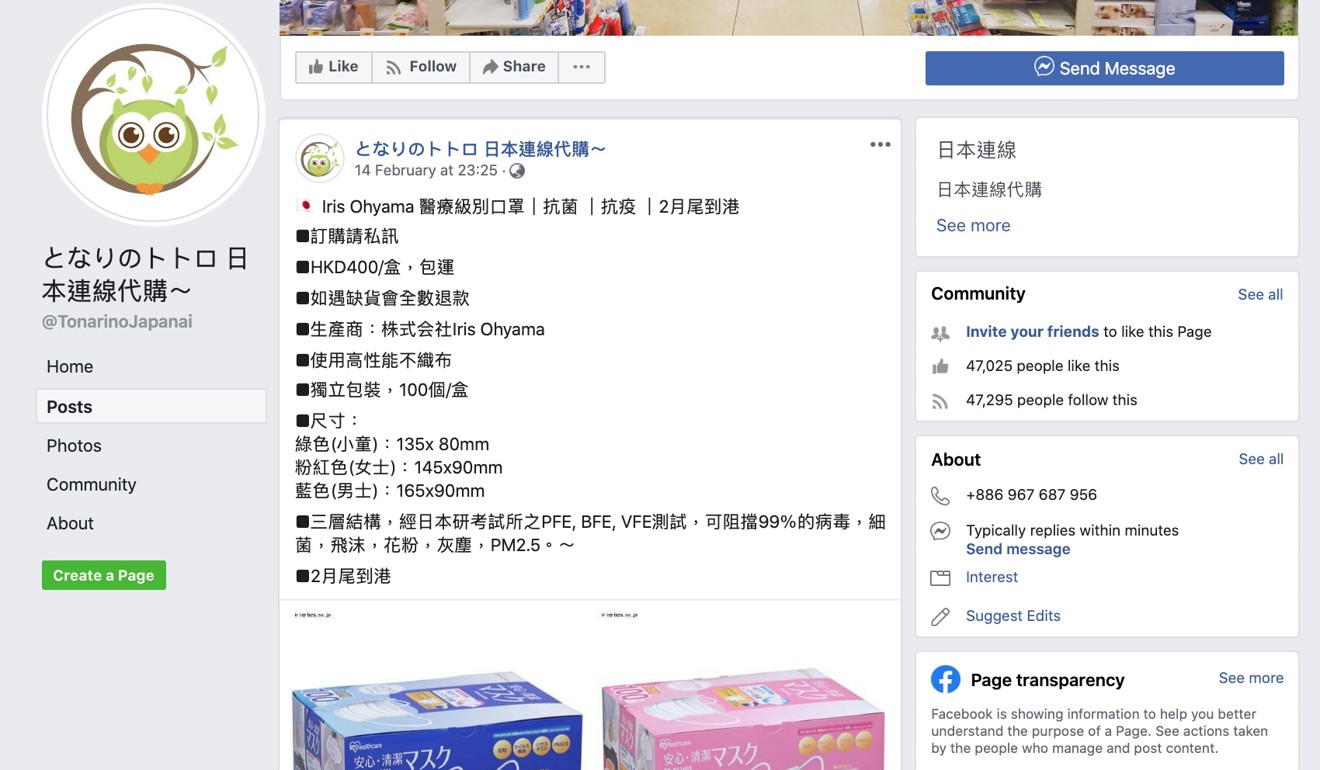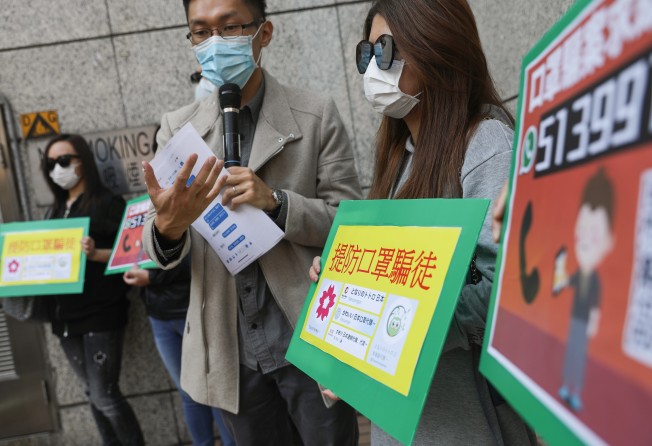
Scores of Hongkongers hit by mask scam on Facebook, hundreds more could be fraud victims since coronavirus outbreak
- Consumer Council members believes an organised gang is behind the con, which preys on those trying to protect themselves from Covid-19
- About 100 complaints lodged over Facebook pages, but 700 in total could be victims of fraudulent selling of masks

About 100 Hongkongers have fallen victim to mask scams orchestrated by an organised gang on Facebook, according to a Consumer Council member who has received hundreds more complaints about similar cons during the coronavirus outbreak.
Scammers advertised boxes of 100 surgical masks for sale at up to HK$400 each (US$51) on the social media platform but they did not deliver the products after receiving payment, said council member Ramon Yuen Hoi-man, from the Democratic Party.
Yuen, who accompanied four victims reporting the deceptions at Sham Shui Po Police Station on Friday, said those caught up in the swindle on Facebook had lost HK$60,000 (US$7,700) in total.
“The administrators of these Facebook pages selling face masks have similar practices when scamming consumers. I believe a group is behind them,” he said.

“Some of the pages left the same contact numbers and used the same wording in their posts. The scammers are very cunning because they change their logos and names to avoid being spotted.”
Yuen, also a district councillor in Sham Shui Po, said there were seven pages implicated in the scam with names such as Tonarino Japanai, Tokyo Honey and Tokyoshop.
Several appeared legitimate with thousands of “likes”, while administrators kept up the facade by hiding or deleting negative comments.
The outbreak of Covid-19, the disease caused by the coronavirus, triggered a shortage of masks in Hong Kong earlier this month, with desperate residents queuing for hours and looking overseas for supplies.
One of the victims of the scam on Facebook, surnamed Lam, said she bought two boxes of masks in early February from Tonarino Japanai.
“I was desperate to buy masks then because of the shortages. I saw the Facebook advertisement for the masks, so I ordered two boxes from them,” Lam said.
“They promised to deliver on February 20 and we agreed to meet up for the masks. After I paid, they just told me to meet in Kowloon without a specific location. When I checked again, they just blocked me on Facebook.”
Lam said there were more than 60 victims like her in an online victim group for Tonarino Japanai alone involving more than HK$50,000 worth of fraud. One victim lost HK$3,000 from attempting to buy masks.
Yuen said some victims complained about the Facebook pages, but there was no response from the social media giant.
A spokeswoman from Facebook said: “We take violations to our commerce policies and community standards very seriously and we will remove content and accounts that are found to violate our policies.
“We encourage our community to report any potential violations and we will quickly review and take the appropriate action.”
The Post understands that the platform had removed some accounts and pages relating to mask scams and it has been working with law enforcement agencies on investigations.
Tonarino Japanai and Tokyo Honey were still advertising masks from Japan for sale on Friday.
They were charging HK$400 per box and promised to deliver at the end of February. The two pages were set up in 2014 and 2016 respectively, mainly selling Japanese anime figures.
The Post messaged both pages on Facebook posing as customers seeking five boxes of masks. Both sent back the same reply detailing online payment details and giving an identical mobile number. They quickly agreed to a HK$50 discount on each box when asked.
The WeChat payment receiver of Tonarino Japanai was named Max Xie. When the Post reporter revealed her identity to Tonarino Japanai and asked for a response, she was given a foul-mouthed reply and blocked.
There was no connection when the mobile phone numbers were dialled.
“I hope police and Facebook can act swiftly to prevent these social media accounts to scam more people,” Yuen said.
The 100 complaints over the Facebook pages are among some 700 people who have sought Yuen’s help over mask scams, claiming a total loss of HK$360,000 (US$46,000).
On Thursday, police arrested a man for obtaining property by deception related to selling masks through a Facebook page called Healthy Lives.
Police said 100 victims paid a total of HK$30,000 for masks that were not delivered.
Meanwhile, the Hospital Authority warned of fraudulent emails sent to some of its suppliers trying to get them to pass over information. It urged the public to be vigilant and said the matter had been reported to police.
Additional reporting by Kanis Leung